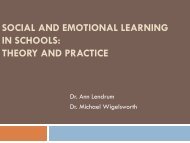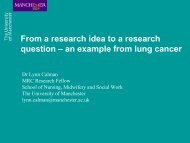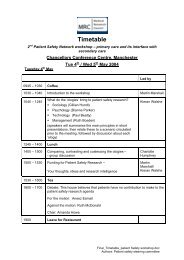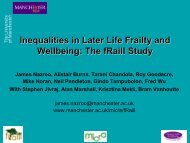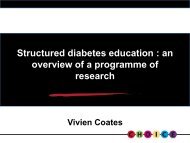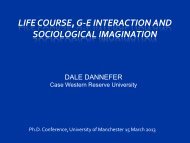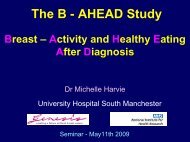4th edition new draft.pub - The University of Manchester
4th edition new draft.pub - The University of Manchester
4th edition new draft.pub - The University of Manchester
You also want an ePaper? Increase the reach of your titles
YUMPU automatically turns print PDFs into web optimized ePapers that Google loves.
2<br />
Studies to recruit to<br />
BILAG Biologics Register (BILAG BR)<br />
Short title: BILAG Biologics Prospective Cohort<br />
Full title <strong>of</strong> the research: BILAG Biologics Prospective Cohort: <strong>The</strong> Use <strong>of</strong> Novel<br />
Biological <strong>The</strong>rapies in the Treatment <strong>of</strong> Systemic Lupus Erythematosus (SLE)<br />
REC Reference Number: 09/H1014/64<br />
CSP reference: 24407<br />
UK CRN ID: 8251<br />
<strong>The</strong> BILAG Biologics Prospective Cohort is a prospective observational cohort study <strong>of</strong><br />
patients with SLE who are starting treatment with a biologic drug or a conventional, nonbiologic<br />
therapy. <strong>The</strong> study aims to recruit 220 patients into the biologic treatment group<br />
and a further 220 patients into the conventional, non-biologic therapy cohort.<br />
<strong>The</strong> aim <strong>of</strong> the BILAG BR is to ascertain whether using biologics in the routine treatment<br />
<strong>of</strong> SLE is associated with an increased risk <strong>of</strong> hospitalisation for infection, compared to<br />
SLE patients with similar disease activity receiving conventional therapies. <strong>The</strong><br />
secondary purpose <strong>of</strong> the BILAG Biologics Prospective Cohort is to determine the longterm<br />
efficacy <strong>of</strong> biological therapies in the treatment <strong>of</strong> SLE.<br />
This prospective cohort study will recruit an exposed cohort <strong>of</strong> patients with SLE treated<br />
with biological therapies and an unexposed cohort <strong>of</strong> patients with similar disease<br />
characteristics but exposed only to conventional non-biological therapies.<br />
Comprehensive data will be collected at baseline, from the clinic team and the patient,<br />
including data on disease diagnosis and activity, risk factors for infection and routine<br />
laboratory results. Follow-up data will be collected at 3, 6, 12, 24 and 36 months to<br />
include any changes in medications, adverse events, hospitalisations for infections,<br />
disease activity and quality <strong>of</strong> life along with biological samples for biomarker analysis.<br />
Contact<br />
If you would like any additional information regarding the study, please contact Emily<br />
Sutton, BILAG BR Study Coordinator.<br />
Email: Emily.sutton@manchester.ac.uk<br />
Tel: 0161 3061916<br />
Fax: 0161 2751640<br />
BILAG BR<br />
Arthritis Research UK Epidemiology Unit<br />
<strong>The</strong> <strong>University</strong> <strong>of</strong> <strong>Manchester</strong><br />
Rutherford House (Unit 4)<br />
<strong>Manchester</strong> Science Park<br />
40 Pencr<strong>of</strong>t Way<br />
MANCHESTER<br />
M15 6SZ





